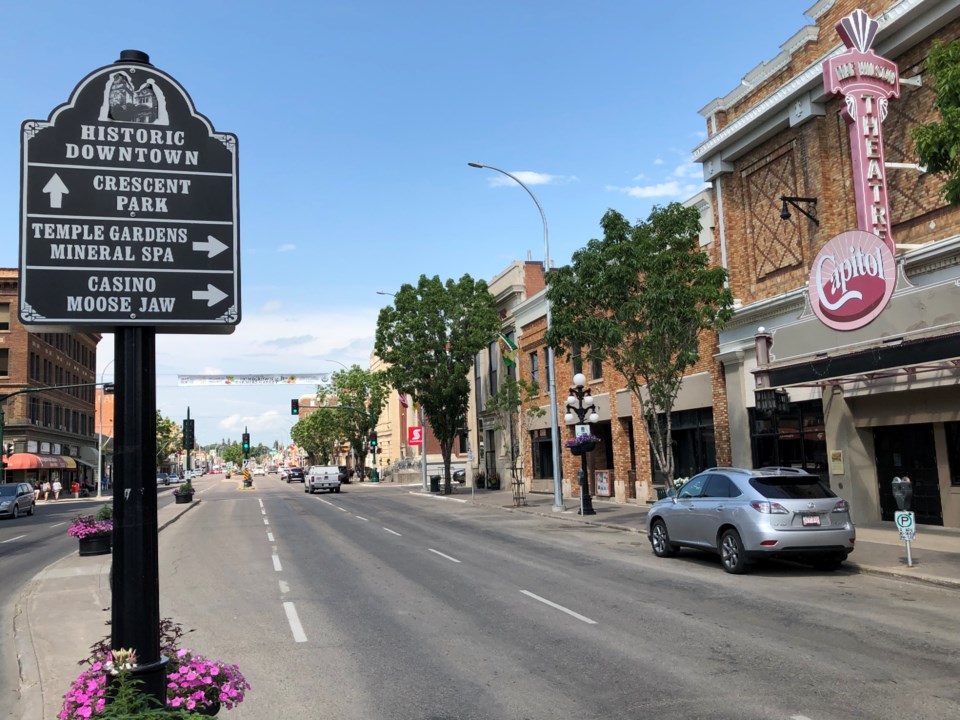MOOSE JAW — City council knows there’s a need for public washrooms downtown to support vulnerable residents, but it has flushed the idea of installing anything because of cost and safety issues.
City administration presented a report during the June 9 executive committee meeting with options that the city could install,
The three options were renting portable toilets, purchasing or leasing a mobile washroom building or constructing a permanent venue. Administration also suggested six possible locations in downtown parking lots.
Currently, there are two downtown washroom venues, the report said, including:
- Crescent Park’s public comfort station, which is open from mid-May to August from 8 a.m. to 7:30 p.m.
- City hall’s main floor washrooms, which are open from 10 a.m. to 4 p.m., Monday to Friday. However, these hours will change to 8:30 a.m. to 4:30 p.m. starting Wednesday, July 2
Meanwhile, details about the three options included:
- Renting portable toilets seasonally for roughly $100 per unit per month, including delivery, pickup, twice-weekly cleaning, waste removal and restocking of supplies, while extra cleanings would be $35 to $50 per service
- Purchasing or renting mobile washroom buildings for $45,000 to $60,000, with a monthly lease of $900 to $1,400. This could be deployed seasonally and requires access to power/water and maintenance; paying cleaning staff and security would cost $20 to $30 per hour
- Constructing a permanent washroom building would cost $200,000 to $600,000; this requires a suitable location with access to services and utilities; cleaning staff and security staff would cost the same as above
There is no money for this in the 2025 budget unless council wants to reduce service levels elsewhere, the report added. Council could direct administration to produce a report for the 2026 budget deliberations with cost estimates and the preferred option.
After discussion, council voted unanimously to receive and file the report — essentially, to do nothing.
Council discussion
Coun. Heather Eby said the issues affecting the downtown haven’t grown any better since last year, while vulnerable people who require downtown washrooms — “It’s a dignity thing” — have limited access.
She reiterated that this downtown venue is needed because homeless and vulnerable people have used businesses’ washrooms and made a mess. Meanwhile, those who can’t access indoor toilets have done their business on the sidewalks.
“It’s horrible that anyone would have to come across that on the sidewalk, but think of the person who has to do that,” she remarked, pointing out that there would have been washrooms with a new Riverside Mission building but the community “didn’t want those things.”
Eby then asked administration whether downtown people used city hall’s washrooms regularly and whether there had been any “inappropriate behaviour” or vandalism.
Brian Acker, director of finance, said the washrooms are used regularly, while there have been some issues. For example, one evening, the caretaker asked him to accompany her to the men’s bathroom because she saw clothes on the floor and thought it was a person — but it turned out to be just clothes.
Eby said she didn’t want this issue to become lost by filing it, while she thought this was a tough issue to vote against. She noted that purchasing a mobile toilet “wouldn’t be the worst use of $60,000 of city money.” Yet, she understood there would be operational costs, cleaning staff wages and security issues, plus potentially “some bad behaviour.”
Coun. Carle Delaurier echoed Eby, saying she preferred the portable toilets that could be moved and would likely incur less vandalism or “overnight stays.”. Yet, she noted that porta-potties that aren’t cleaned aren’t used.
“It is about dignity. It is very much about dignity,” she added. “And I think we need to not lose that.”
Derek Blais, director of community services, said having a downtown washroom would require having sufficient staff to clean it, enough oversight — or security — to ensure no bad behaviours occurred and enough protection for employees.
Continuing, Blais said staff from three different divisions — including the outdoor pool — clean, check and close the comfort station in Crescent Park. Moreover, some employees put in overtime on the weekends to close the venue.
He noted that they implemented a safety-focused buddy system this year because of situations that happened last year where staff came to clean or close the building and ran into trouble. Also, he’d like to keep the comfort station open longer, but it’s just not possible operationally or economically.
Coun. Patrick said this venue would “end up as an operational nightmare” that would cost thousands annually. Meanwhile, he didn’t think this was the city’s responsibility or mandate and claimed it was the jurisdiction of Social Services.
The next executive committee meeting is Monday, June 23.




